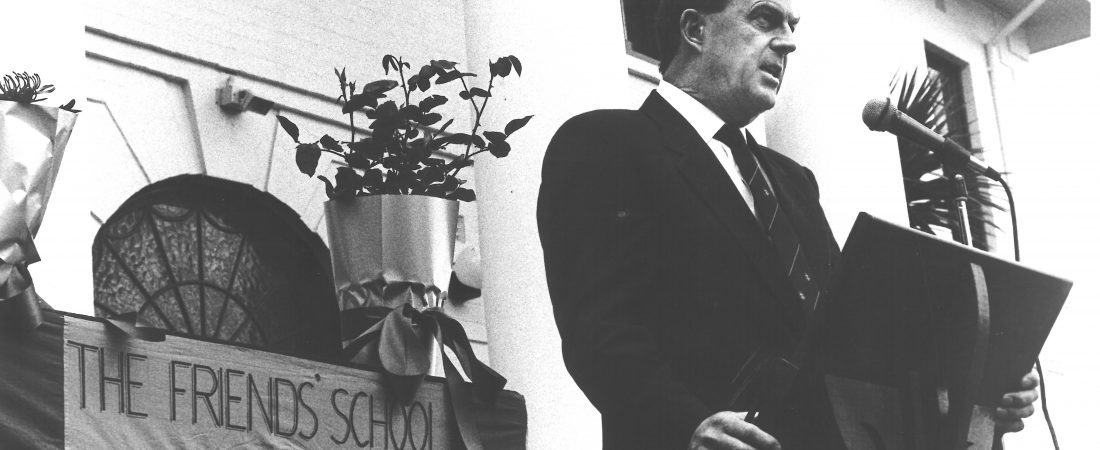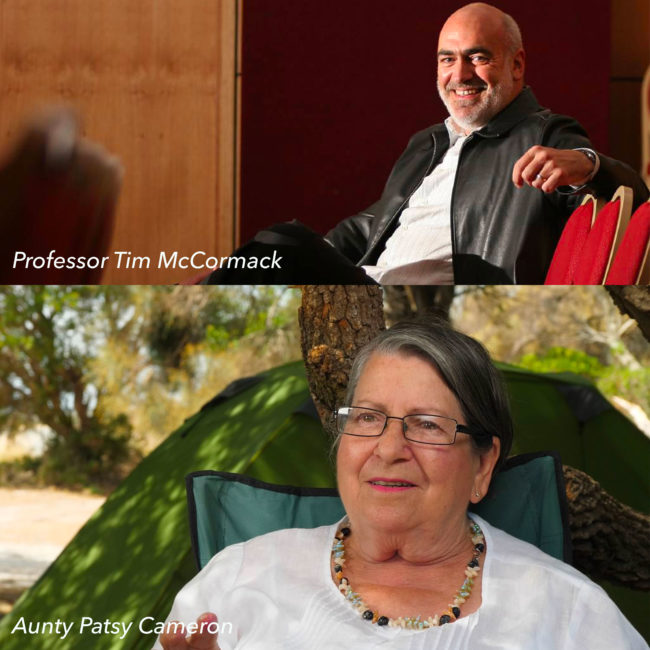The Peter Underwood Peace & Justice Lecture
The biennial Peter Underwood Peace & Justice Lecture was established by The Friends’ School in 2015 as a small measure to honour Peter Underwood.

Peter Underwood Peace & Justice Lecture 2021
The Friends’ School was fortunate to have special guest speakers Aunty Patsy Cameron and Professor Tim McCormack present the Peter Underwood Peace and Justice Lecture on 29 April 2021. The Lecture was an important step in our Clemes Friendly Conference journey in which we, as a community, explore the idea of Reconciliation with Australia’s Indigenous community. Year 10, 11 & 12 students, along with some staff and guests, heard Aunty Patsy’s personal connection to the colonial period wrongdoing and continuing injustices to our indigenous community. Tim provided a thought-provoking connection to recent legal decisions fulfilling agreements with First Nations Peoples from around the world. It was clear to all who listened and ask questions at the end of the lecture, that every person in Tasmania needs to hear the stories shared by Aunty Patsy and Tim if indeed our goal is to have a more just society to live in.

Through this lecture series, The Friends’ School aims to encourage our students and our community to think about how each of us might actively pursue peace through exposure to differing ideas and perspectives and the attainment of knowledge and understanding. Whilst the School and the Underwood family may not necessarily endorse the views of guest speakers they do adhere to the principle that we must not restrict debate or deliberation and instead we must commit ourselves to the democracy of ideas. It is for members of our community to make their own judgments.
Peter Underwood served in the Royal Australian Navy, and upon graduation from The University of Tasmania in 1960 served as a brilliant trial advocate for more than 20 years. In 1984 he was appointed a Judge of the Supreme Court of Tasmania and was asked to extend that service as Chief Justice in 2004. Peter Underwood was sworn in as Governor of Tasmania in 2008 and served in that role until his untimely death on 7 July 2014.
Peter Underwood also served the wider community in the Arts and more specifically as the Presiding Member of the Executive Committee of the Board of Governors of The Friends’ School in the 1990s. It was a difficult time for The Friends’ School as the buildings were in need of desperate repair in order to remain standing. Peter helped to guide the School through this difficult time with clearness of thought, firmness of purpose and a passion for getting the job done.
The ‘need to establish peace and justice’ is a core value at Friends. Our hope is that each student and each community member attending these lectures will reflect on what they can do to ‘actively pursue peace’ and ‘let their life speak’.
Surely then we all have, as our late Governor urged, a duty to actively strive for peace on a daily basis; the peace that our soldiers thought they were fighting for and continue to do so; the peace so many died for and continue to do so; the peace their families suffered for and continue to do so; the peace that relates directly to me and you and the quality with which we all live our lives; the peace that is a public good. The peace that is in everyone’s self interest.
“Let there be peace on earth and let it begin with me.”
“My time at Friends’ did influence the way I thought. I still speak of Friends’ to others as a wonderful school, the kind you’d like every child to be in. And by the time I left, I’d ingested a deep sense of the rightness of the idea of peace. It was there, in the culture of the School, where peace was a conviction, not an ideology, and religion not a doctrine to enforce how other people should behave. It was there in classroom teaching, in stories about people working for peace and in the way the school was run. From the discouragement of aggressive competitiveness in class and in sport to the intolerance of all kinds of bullying. There was also a degree of gender equality unthinkable even in most other co-educational schools at the time.” – Stephen Fitzgerald